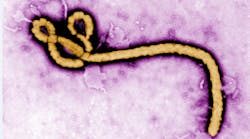In response to the ongoing, international spread of the Ebola virus, the Pipeline and Hazardous Materials Safety Administration (PHMSA) yesterday published a Safety Advisory in the Federal Register for persons and businesses that prepare, offer, and transport materials that are or may be contaminated with Ebola.
The U.S. DOT regulates materials that are or may be contaminated with the Ebola virus as Class A infectious substances in its Hazardous Materials Regulations (49 CFR 171-180). This classification does not apply to Ebola-contaminated waste that has been appropriately incinerated, autoclaved, or otherwise inactivated.
The new guidance document covers procedures for handling, shipping, and transporting Ebola-infected waste, including:
- Selecting proper packaging;
- Treating Ebola-contaminated waste before transport;
- Closing the container to prevent tears, leaks, or other damage in transit; and
- Operational controls for medical facilities and transporters.
PHMSA recognizes that shipping or transporting large volumes of Ebola contaminated waste may require variance from the hazmat regulations. It issued a non-site-specific special permit to allow for alternative packaging in these cases. Shippers and waste haulers can apply for party status to the special permit, DOT SP-16279, in accordance with 49 CFR 107.107. To request a unique special permit, shippers and waste haulers should follow the rules at 49 CFR 107, Subpart B.
To help employees protect themselves and colleagues from infection, the Center for Disease Control (CDC) has published guidance on handling Ebola-contaminated materials before transport.
General awareness, security awareness and function-specific training is available online for hazmat employees who prepare shipments of Ebola-contaminated material and other Category A and B infectious substances. For example, Lion offers the Shipping Infectious Substances Online Course. Hazmat employee training is required once every three years. [49 CFR 172.704]
Such training is designed to prepare employees and shipping managers for classifying, naming, packaging, marking, labeling, and documenting shipments that contain infectious substances.




